|
The Company Setup form is accessed by clicking on the Utilities bar, followed by the Company Setup icon within the OrderStream profile.
This form is used to enter information about your company such as address, phone numbers, accounting system, fiscal year setup, etc. The company setup data is typically entered during the implementation of OrderStream, but it can be modified at a later time if required. Please consult Seradex if you are required to make a change in Company Setup and you are unsure of what effects the change(s) will make in the system.
Company Info Tab
The Company Info tab is used to enter your company's primary data, such as address, phone and fax numbers, and web site. The form appears as shown in the image below.
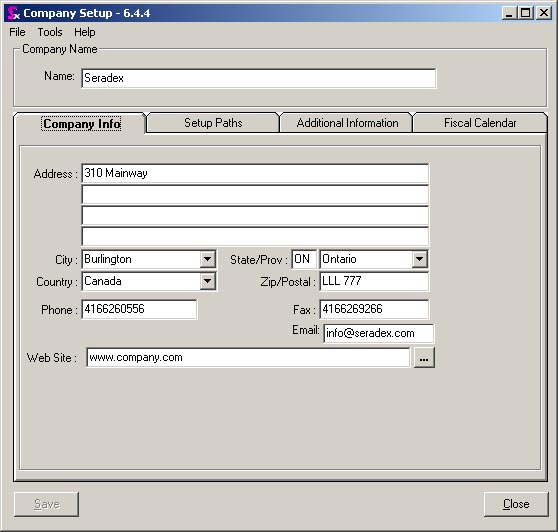
Setup Paths Tab
The Setup Paths tab records folder locations for auxiliary files required by Seradex, such as product line and price list excel workbooks. The form appears as shown in the image below.
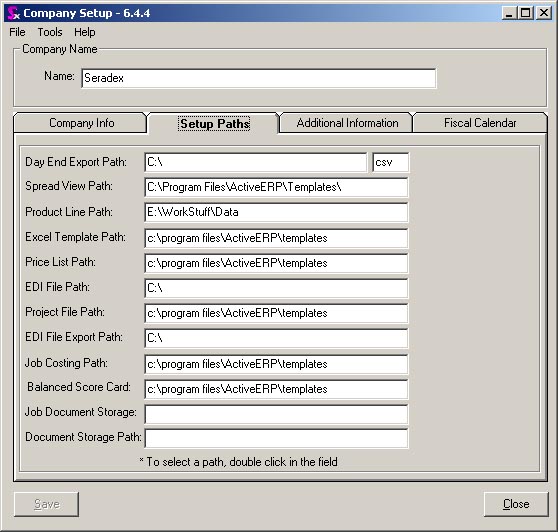
To select a path double click in the text box corresponding to the path you wish to set. A dialogue box will open allowing the user to browse to the directory where the required files are located.
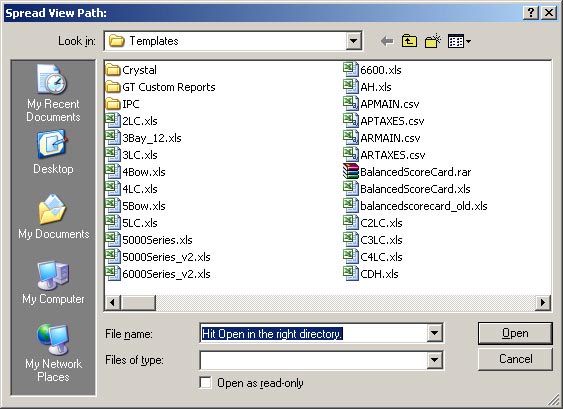
It is strongly recommended to place OrderStream files such as product line workbooks, price list workbooks, scheduling files, etc. in the local machine's Templates folder, or a sub folder containing within, to maximize performance and to ensure AutoUpdater is able to successfully update these files from the master copies residing on your server.
|
|
|
Day End Export
|
The location where Day End Processing will place the day end batch file.
|
Spread View
|
The location where the OrderStream spread settings file will be saved when a user elects to save their spread settings. These files have a file extension of .ss3. Also the files generated by the various module's search forms (sales order, work order, etc) are saved to this path. The search files have a file extension of .adtg.
|
Product Line
|
The path where configurator product line excel workbooks are located.
|
Excel Template
|
The location where the master configurator excel template (template.xls) is stored. This is used when the Create Excel Spreadsheet functionality is used in Configurator Setup.
|
Price List
|
The path where the customer (Pricelist.xls) and vendor price list (vendorpricelist.xls) excel workbooks are located.
|
EDI File
|
The default path from where EDI files are imported into OrderStream.
|
Project File
|
The path where the Microsoft Project template file (SX-Schedule.mpd) used by OrderStream Scheduling is located.
|
EDI File Export
|
The default path to which EDI files are exported.
|
Job Costing
|
The path in which the Job Costing Summary workbook (JobCost.xls) is located.
|
Balanced Score Card
|
The location where the Balanced Scorcard Excel workbook (BalancedScoreCard.xls) resides.
|
Job Document Storage
|
The location where default template files used for job costing are located. The Job Costing module Document Manager will then create a new folder for each job costing document and copy the files present in the Job Document Storage path to the newly created folder.
|
Document Storage
|
The default location where Document Storage files (for use in the Item Main) are located. When attaching a document storage file, the dialog box will open to the path specified in this field.
|
Additional Information Tab
The Additional Information tab is used to enter additional company information. The form appears as shown in the image below.
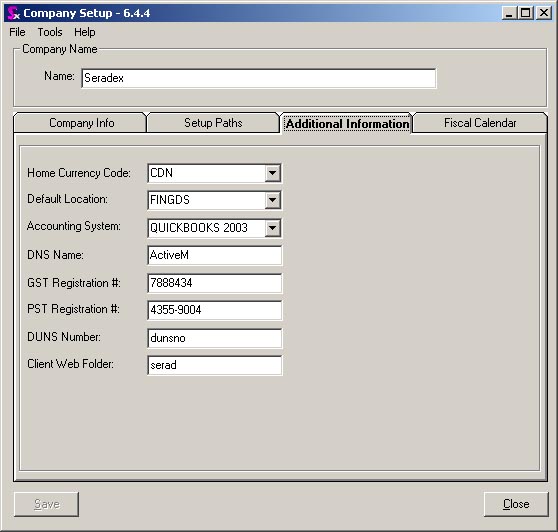
|
|
|
Secondary Company Name
|
A second name for the company. Example: TSN is a division of Bell Media Group.
|
Home Currency Code
|
The native currency code for your company.
|
Default Location
|
A default location can be specified and used for custom applications or reports.
|
Accounting System
|
Select the accounting system used by your company from the combo. How Day End Processing functions depends on the selection made here.
|
DNS Name
|
The DNS number is used when you wish to print one of your company's custom reports via a reports menu option for the equivalent standard report (e.g Sales Order Pick List). See the OrderStream Administrator's manual for more information.
|
GST Registration #
|
Your company's GST registration number as issued by the Canadian Revenue Agency.
|
PST Registration #
|
Your company's PST registration number as issue by the Consumer Taxation Branch.
|
DUNS Number
|
DUNS stands for "Data Universal Numbering System." It is a unique nine-digit numbering system that is used to identify a business. Enter your company's DUNS number into this field to make it available for printing on custom reports.
|
Client Web Folder
|
This field is used for licensing purposes and should not be modified without being directed to do so by Seradex. Please consult your project manager for more information.
|
Fiscal Calendar Tab
As the name indicates, the purpose of the Fiscal Calendar tab is to setup your company's fiscal calendar. The form appears as shown in the image below.
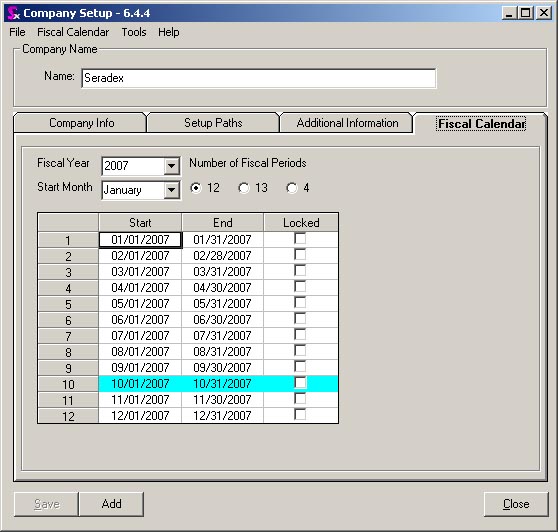
Creating Fiscal Years
First select the first month of your fiscal year and the current year, then click the radio button representing the number of fiscal periods you are required to create. When you are ready to create your fiscal year click the Add button. After clicking Add the following prompt will appear.
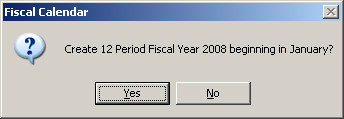
Clicking No will cancel the creation of the new fiscal calendar, while clicking Yes will proceed. The form will reload and display the newly created fiscal calendar.
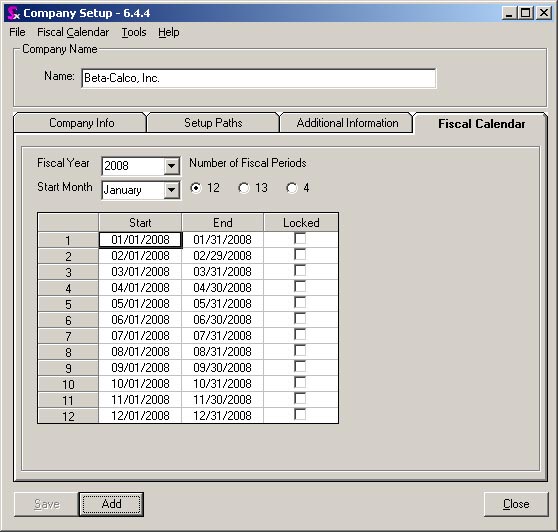
You are able to go back and view past fiscal years by selecting the desired year from the Fiscal Year drop down.
Locking Fiscal Periods
To lock a fiscal period to prevent Day End Processing batches to be created against it, click the Locked check box for the period you wish to lock then click the Save button. If you try to run Day End Processing against a fiscal period which has been locked you will receive the following prompt prior to the loading of the Day End Processing form.

The Day Processing form will load but it will be locked, preventing the user from taking any action.
|

